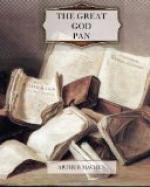Austin said nothing, but nodded his head slightly; he still looked white and sick. Villiers pulled out a drawer in the bamboo table, and showed Austin a long coil of cord, hard and new; and at one end was a running noose.
“It is the best hempen cord,” said Villiers, “just as it used to be made for the old trade, the man told me. Not an inch of jute from end to end.”
Austin set his teeth hard, and stared at Villiers, growing whiter as he looked.
“You would not do it,” he murmured at last. “You would not have blood on your hands. My God!” he exclaimed, with sudden vehemence, “you cannot mean this, Villiers, that you will make yourself a hangman?”
“No. I shall offer a choice, and leave Helen Vaughan alone with this cord in a locked room for fifteen minutes. If when we go in it is not done, I shall call the nearest policeman. That is all.”
“I must go now. I cannot stay here any longer; I cannot bear this. Good-night.”
“Good-night, Austin.”
The door shut, but in a moment it was open again, and Austin stood, white and ghastly, in the entrance.
“I was forgetting,” he said, “that I too have something to tell. I have received a letter from Dr. Harding of Buenos Ayres. He says that he attended Meyrick for three weeks before his death.”
“And does he say what carried him off in the prime of life? It was not fever?”
“No, it was not fever. According to the doctor, it was an utter collapse of the whole system, probably caused by some severe shock. But he states that the patient would tell him nothing, and that he was consequently at some disadvantage in treating the case.”
“Is there anything more?”
“Yes. Dr. Harding ends his letter by saying: ’I think this is all the information I can give you about your poor friend. He had not been long in Buenos Ayres, and knew scarcely any one, with the exception of a person who did not bear the best of characters, and has since left—a Mrs. Vaughan.’”
VIII
THE FRAGMENTS
[Amongst the papers of the well-known physician, Dr. Robert Matheson, of Ashley Street, Piccadilly, who died suddenly, of apoplectic seizure, at the beginning of 1892, a leaf of manuscript paper was found, covered with pencil jottings. These notes were in Latin, much abbreviated, and had evidently been made in great haste. The Ms. was only deciphered with difficulty, and some words have up to the present time evaded all the efforts of the expert employed. The date, “XXV Jul. 1888,” is written on the right-hand corner of the Ms. The following is a translation of Dr. Matheson’s manuscript.]




